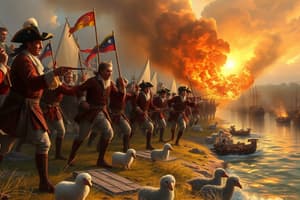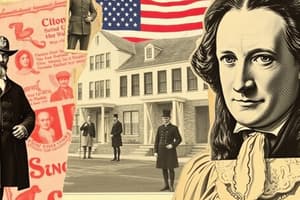Podcast
Questions and Answers
Who was Benjamin Franklin?
Who was Benjamin Franklin?
- King of England during the American Revolution
- American diplomat who contributed to the war (correct)
- British general known for his tactics
- French philosopher who influenced the revolution
Who is remembered for being a traitor in the American Revolution?
Who is remembered for being a traitor in the American Revolution?
Benedict Arnold
Which British general led the southern campaign and lost at Yorktown?
Which British general led the southern campaign and lost at Yorktown?
Lorn Cornwallis
Who was the King of England during the American Revolution?
Who was the King of England during the American Revolution?
Who wrote the pamphlet 'Common Sense'?
Who wrote the pamphlet 'Common Sense'?
Who is known for the idea of natural rights?
Who is known for the idea of natural rights?
Who led the failed invasion of New York from Canada in 1777?
Who led the failed invasion of New York from Canada in 1777?
Who was the author of the Declaration of Independence?
Who was the author of the Declaration of Independence?
What term refers to those who favored war with the British?
What term refers to those who favored war with the British?
What is a mercenary?
What is a mercenary?
What does it mean to be radical during the revolution?
What does it mean to be radical during the revolution?
What is an ally in the context of war?
What is an ally in the context of war?
What is a loyalist?
What is a loyalist?
What are natural rights?
What are natural rights?
What is a traitor?
What is a traitor?
What does cavalry refer to?
What does cavalry refer to?
What is a siege?
What is a siege?
What does preamble refer to?
What does preamble refer to?
What historical event took place at Lexington and Concord?
What historical event took place at Lexington and Concord?
What was the significance of the Battle of Bunker Hill?
What was the significance of the Battle of Bunker Hill?
What happened at Long Island in 1776?
What happened at Long Island in 1776?
What occurred during the Battle of Trenton?
What occurred during the Battle of Trenton?
What was the turning point of the American Revolutionary War?
What was the turning point of the American Revolutionary War?
What was the outcome of the Battle of Monmouth?
What was the outcome of the Battle of Monmouth?
What was Morgan's tactical success at Cowpens?
What was Morgan's tactical success at Cowpens?
What was the significance of Yorktown?
What was the significance of Yorktown?
Flashcards are hidden until you start studying
Study Notes
Key Figures in the American Revolution
- Ben Franklin: American diplomat and scientist from Philadelphia; instrumental in securing French support during the Revolutionary War.
- Benedict Arnold: American general known for his bravery; later became infamous for his treason.
- Cornwallis: British general responsible for the southern campaign; defeated by Washington at the Battle of Yorktown.
- George III: Reigning King of England during the American Revolution.
- Thomas Paine: Author of the influential pamphlet "Common Sense," advocating for independence.
- John Locke: Enlightenment philosopher associated with the concept of natural rights influencing revolutionary thought.
- John Burgoyne: British general involved in a failed invasion of New York in 1777; surrendered at the Battle of Saratoga.
- Thomas Jefferson: Virginia lawyer and planter; principal author of the Declaration of Independence.
Key Terms and Concepts
- Patriot: Individuals who supported war against British rule, advocating for independence.
- Mercenary: Professional soldiers hired to fight, typically not aligned with the cause.
- Radical: Individuals calling for significant societal change and reforms.
- Ally: Allies formed to achieve shared political goals against common enemies.
- Loyalist: People preferring peaceful negotiations to resolve conflict with Britain.
- Natural Rights: Fundamental rights inherent to individuals at birth, deriving from a creator rather than governmental authority.
- Traitor: An individual who betrays their own country or cause.
Military Terms
- Cavalry: Troops mounted on horseback, crucial for mobility in battle.
- Siege: A military tactic involving surrounding an enemy position to compel surrender.
Significant Events and Battles
- Preamble: The introduction to foundational documents such as the Declaration of Independence.
- Lexington and Concord: Marked the first military engagements of the American Revolutionary War.
- Bunker Hill: Notable for being the first major battle of the war; a costly victory for British forces.
- Long Island: Significant British victory in 1776 resulting in the control of New York City.
- Trenton: Notable battle initiated by Washington's daring nighttime crossing of the Delaware River.
- Saratoga: Turning point of the war; Burgoyne's surrender shifted momentum toward the American forces.
- Monmouth: Tactical draw between American and British forces, highlighting Washington's persistent efforts.
- Cowpens: Victory for General Morgan achieved through innovative battlefield strategies.
- Yorktown: Final major conflict leading to the conclusion of the American Revolution, resulting in British surrender.
Studying That Suits You
Use AI to generate personalized quizzes and flashcards to suit your learning preferences.




